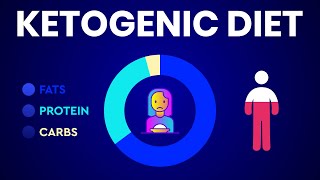Keto Diet: Benefits & Side effects of Ketogenic Diet.
Keto Diet: Benefits & Side effects of Ketogenic Diet.

First, I want you to know what a ketogenic diet is.
• A ketogenic diet is high in fat, moderate in proteins and low in carbohydrates.
• Most Ketogenic diet plans recommend having 70% of your calories as fat, 25% from protein and only 5% from carbs.
o Yes you heard it right! Only 5% of carbs!
• Carbohydrates are important because after they are absorbed as glucose after the digestion.
• Glucose is utilized in the mitochondria of cells to produce energy in the form of ATP.
Ketogenic diet restricts carbohydrates! Then how can we generate ATP?
o Good question! When there’s lack of glucose, the body breaks down the stored fat and produce another type of molecule called ketone bodies. These ketone bodies can be utilized to generate energy in the form of ATP.
o When the ketone bodies accumulate in the body, it is called ketosis. Too much of ketone bodies can be very fatal. So you’ll have to be very careful to maintain the ketone bodies at a non-toxic level. We’ll get to it later!
Right! So what can you eat on a keto diet!
o You can eat a larger amount of high-fat foods, such as avocado, cheese, butter, egg yolk & bacon
o And moderate amounts of protein, such as fish, meat, egg-white & poultry.
o You are not advised to eat carb-rich foods, such as bread, cereals, rice, potatoes, and other starchy vegetables, and fruit juices.
o Instead you can eat tiny amounts of low carb vegetables, such as leafy greens, tomatoes and mushrooms.
All right! Are you ready talk about the long list of benefits of keto diet?
• In the 19th century, long before Insulin was discovered, there was a need for a low-carb diet for diabetic patients. And of course, keto diet did just that!
• And in 1920, keto diet was introduced to epileptic patients in whom anti-epileptic medications were not effective.
• The ketogenic diet is also being used, in closely monitored settings for cancer, polycystic ovary syndrome and acne. Doctors and scientists are still conducting researches to find the exact mechanism for these beneficial effects. One hypothesis is that low-carb ketogenic meals lower the insulin levels in the body. Since Insulin is a growth stimulating hormone, its absence can slow down cancer, polycystic ovarian syndrome and acne breakouts.
• What do you think happen to the blood cholesterol levels, if you switched to a fat-rich ketogenic diet?
o Strangely, it was found that LDL, or the bad cholesterol levels were lowered and HDL or the good cholesterol levels were increased.
o Scientists believe this strange phenomenon is due to the low levels of insulin in the blood.
o These observations hint that ketogenic diet could be protective against ischemic heart diseases and strokes.
• Since the 1970’s the ketogenic diet is gaining considerable popularity, due to its weight loss potential. The exact mechanism of weight loss is still not confirmed.
o One theory suggests that it takes more calories to convert fat into ATP that what it takes to convert glucose into ATP.
o Another theory points out that high amounts of fat and proteins in the diet satisfy your appetite faster.
Well, Then what do people fear about ketogenic diet?
o The most dreaded complication is the keto-acidosis. Too high levels of ketone bodies, especially in people with type 1 diabetes, can cause this potentially fatal condition. Therefore, it is always advised to consult your physician before you start a ketogenic diet
o A high-fat diet may be challenging to maintain. You might develop symptoms of carbohydrate restriction like hunger, fatigue, irritability. Constipation, headache and brain fog.
o As long term side effects, you could increase the risk of developing Osteoporosis and Renal stones.
Such an exhausting topic. I’m sure you would appreciate to learn the bottom line of this!
– Available research on Ketogenic diet is still limited.
– Early evidence may suggest that ketogenic diet is beneficial in short term weight loss.
– But the side effects and the difficulty of compliance question the use of ketogenic diet as a long term weight loss plan.
– While most dieticians still recommend a balanced diet based on the plate model, one may try ketogenic diet when other methods fail.
– But it is advised to follow a ketogenic meal under medical supervision with close monitoring of blood ketone bodies.
– Once you achieve the target weight loss, then you can seek the help of a dietician to get back to a balanced diet again.
